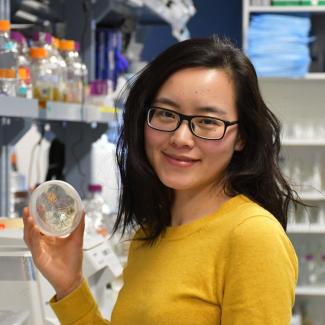Event
Using Symbiodiniaceae mutants to interrogate dinoflagellate-coral symbiosis
Dr. Tingting Xiang, UC Riverside

Abstract: The dinoflagellate algae in the family Symbiodiniaceae form critical symbiotic relationships with a variety of cnidarian hosts, including corals, sea anemones, and jellyfish. Residing within the gastrodermal tissue of their hosts, these algae provide photosynthetically fixed carbon, while the hosts supply essential inorganic nutrients and offer protection from environmental threats. This metabolic exchange is fundamental to the survival of coral reefs, yet the molecular and cellular processes that underpin the establishment and maintenance of this symbiosis remain largely unknown. Our lab focuses on unraveling these processes by developing a mutagenesis pipeline for Symbiodiniaceae, enabling the creation of mutants to serve as key tools for probing the mechanisms governing symbiosis. Using these mutants, we are addressing critical questions regarding the initiation and stability of the symbiotic relationship. For example, we generated photosynthesis mutants (LBR1 and ORA1) and demonstrated that photosynthetic activity is not required for symbiosis initiation, challenging a long-held paradigm in the field of coral-algal symbiosis. Building on this work, our recent research has focused on the biosynthesis of chlorophyll c, a key photosynthetic pigment in dinoflagellates, and the identification of CHLOROPHYLL C SYNTHASE (CHLCS), the enzyme responsible for its production. We successfully expressed CHLCS in planta, providing insights into both the evolution of photosynthetic machinery and the potential for bioengineering applications. These findings offer new perspectives on the molecular underpinnings of coral-algal symbiosis and could inform strategies to protect coral reefs and sustain marine biodiversity amid global climate change.
Twitter/X: @Xiang_lab/
Xiang Lab: Xianglab.ucr.edu
